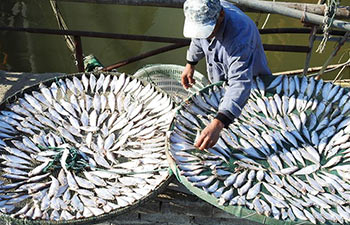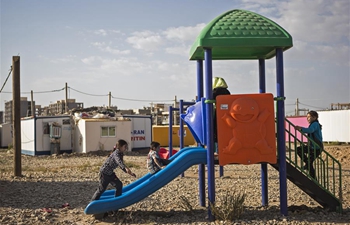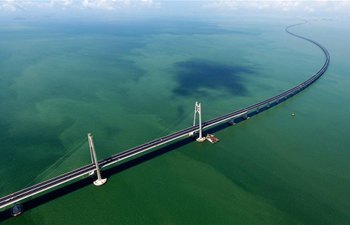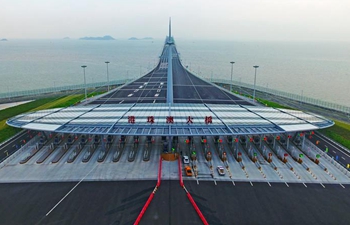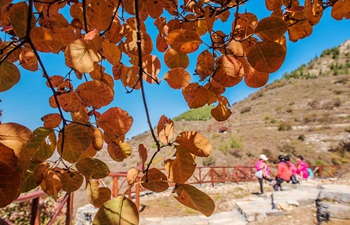
Workers clear debris from the shipwreck of "Corfu Island" in the repair zone of Perama, Greece, on Oct. 30, 2018. Thirty two years after she sunk at Dock II of Perama's ship repairs zone while undergoing repairs, "Corfu Island" was recovered this autumn. The raising and towing of the wreck of the Greek-owned ferry is the first step of a wider project launched by the Greek authorities to clear the Saronic Gulf waters from dozens of such shipwrecks, officials said here on Tuesday. (Xinhua/Marios Lolos)
PERAMA, Greece, Oct. 30 (Xinhua) -- Thirty two years after she sunk at Dock II of Perama's ship repairs zone while undergoing repairs, "Corfu Island" was recovered this autumn.
The raising and towing of the wreck of the Greek-owned ferry is the first step of a wider project launched by the Greek authorities to clear the Saronic Gulf waters from dozens of such shipwrecks, officials said here on Tuesday.
"Corfu island" as well as many other vessels which sunk in the area remained abandoned at the sea bottom for years due to legal and bureaucratic reasons.
In the context of efforts to upgrade Piraeus port and neighboring coastal municipalities, local authorities plan to remove in the near future at least 38 more wrecks to make way for works which will further improve the image of Greece's largest port and support the economic revival of the wider area, according to Dimosthenis Bakopoulos, head of the Public Ports Authority.
"We will link this program of shipwrecks' removal which will put an end to an environmental crime going on for over 40 years which has downgraded the sea environment along coastal municipalities, with an effort to reconstruct the ship repairing operations in Perama," he told Xinhua during a tour at a corner of Perama's ship repairs zone where "Corfu Island" was towed to.
For several decades, the heart of Greece's ship repair industry was beating at this suburb of Piraeus port, until it was hit hard by the Greek debt crisis which broke out in 2009.
The image of Piraeus and the wider region is changing dramatically since China's COSCO Shipping took over in 2016 the management of Greece's largest port after winning an international tender.
Greek authorities and Chinese investors move forward together to uplift the area, Bakopoulos said.
The wreck removal of "Corfu Island" was part of these efforts. The process started in December 2017, Bakopoulos explained, and was concluded this October, with no cost for the Greek state.
The rusted wrecks are usually sold as scrap metal by the contractors who cover the salvage operation costs. In Greece's case in recent years wrecks end up in ship breaking yards in neighboring Turkey, where the vessels are dismantled or scrapped for recycling their metal parts.
Bakopoulos said on Tuesday that the goal is to keep "Corfu Island" in Greece. Currently workers in Perama remove the mud and debris.
"The message is that as the state and diving experts have the means to recover all shipwrecks. I would also say that our goal and wish is that we will manage them in Greece and we will no longer have to take our ships to Turkey," Kostas Nizamis, owner of the Greek Diving Center which specializes in shipwrecks' salvage operations, added.
The recovery of "Corfu Island" was the most challenging operation he has ever faced, he said, due to a large hull breach which made re-floating more difficult.
Despite the challenges, action must be taken, he said.
"There is a legal void and as a result several shipwrecks were left harming the environment. Currently nearby outside Psytalia (an uninhabited island of the Saronic Gulf) fuel has started leaking from a shipwreck after 12 years. Who will manage this? The state should make stricter laws so that the cost of wreck removal is covered by managing companies for all ships that are sinking,"Nizamis stressed.
Anastasios Chondromatidis, co-founder of Intermarinco, a local company which was also involved in the operation providing technical assistance, explained the obstacles they faced.
"The task was very difficult for two reasons. Firstly it was the shipwreck's age. It was at the sea bottom for 32 years. Secondly, we did not have adequate data and were proceeding in the dark, discovering during the operation the particularities of the wreck," he told Xinhua, adding that Greeks can manage such wrecks to avert environmental destruction.
"We are pioneers, we have the knowhow. In addition to our leading position in shipping, we lead the way also in salvage," he said.
